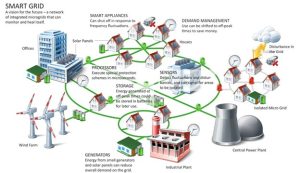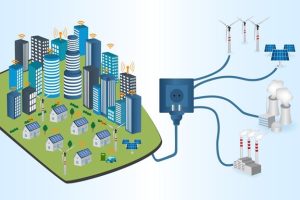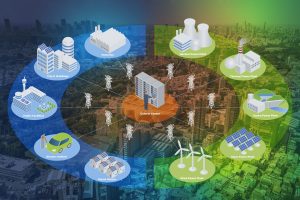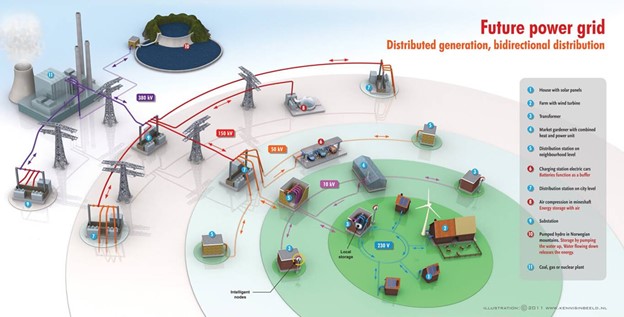
Smart grids are the future of energy distribution, incorporating innovative technologies to provide more efficient and reliable power supply. These grids are capable of integrating various energy sources, both conventional and renewable, to meet the ever-increasing energy demands. The potential advancements in the future of Smart Grids include the integration of artificial intelligence, machine learning, and IoT technologies to improve grid efficiency and reliability. The impact of smart grids on energy consumption is projected to be significant. By facilitating real-time monitoring and control of energy use, smart grids can optimize energy consumption, reduce wastage, and promote energy conservation. As we move towards a more energy-conscious society, the role of smart grids in shaping our energy future cannot be overstated.
The Role of Technology in Shaping Smart Grids
Technology plays a pivotal role in the evolution and future of smart grids. The integration of advanced technologies such as artificial intelligence, machine learning, and IoT can revolutionize the way we generate, distribute, and consume energy. These technologies can enable real-time monitoring and control of energy flows, predictive maintenance of grid infrastructure, and integration of diverse energy sources.
The impact of technological advancements on smart grids is expected to be profound. With the advent of AI and machine learning, smart grids can become more intelligent, capable of self-healing and adaptive to changing energy demands and grid conditions. IoT technologies can further enhance the capabilities of smart grids, enabling remote control of grid operations and real-time data collection for improved decision-making.
The Evolution of Smart Grids Through the Years
The concept of smart grids has evolved significantly over the years, driven by technological advancements and the growing need for more efficient and reliable energy systems. Analyzing past trends, it’s apparent that the future of smart grids lies in the integration of advanced technologies and renewable energy sources. Innovations such as AI, machine learning, IoT, and renewable energy technologies are shaping the evolution and future of smart grids. These technologies are expected to revolutionize the energy sector, enabling the transition towards a more sustainable and resilient energy future.
The Impact of Renewable Energy on Smart Grids

The integration of renewable energy sources is a key aspect of the future of advanced grid. As we strive to reduce our carbon footprint and mitigate the impacts of climate change, the role of renewable energy in shaping our energy future becomes increasingly important. Renewable energy’s impact on smart grids is expected to be significant. By integrating renewable energy sources such as solar and wind, smart grids can become more sustainable and resilient, capable of providing reliable power supply even in the face of changing weather conditions and fluctuating energy demands.
Predictive Analysis for the Future of Smart Grids
Predictive analysis plays a crucial role in shaping the future of smart grids. By leveraging data collected from various grid components, predictive analysis can enable real-time decision-making and proactive maintenance of grid infrastructure. The application of predictive analysis can revolutionize the future of advanced grid, enabling them to become more intelligent and adaptive. By predicting grid conditions and energy demands, smart grids can optimize energy flows, reduce wastage, and improve grid reliability and efficiency.
Challenges and Opportunities in the Implementation of Smart Grids
The implementation of smart grids presents both challenges and opportunities. The integration of advanced technologies and renewable energy sources requires significant investment and a paradigm shift in the way we generate, distribute, and consume energy. However, the future of smart grids also presents numerous opportunities. By revolutionizing the energy sector, smart grids can enable the transition towards a more sustainable and resilient energy future, creating new jobs and fostering economic growth.
The Global Perspective on the Future of Smart Grids

From a global perspective, the future of advanced grid is promising. Many countries are investing heavily in smart grid technologies and renewable energy sources, recognizing their potential in transforming the energy sector. However, there are also challenges in the global implementation of smart grids, including technological, regulatory, and financial barriers. Despite these challenges, the global trends shaping the future of advanced grid are positive, pointing towards a more sustainable and resilient energy future.
The Potential of Smart Grids in Transforming the Energy Sector
The potential of smart grids in transforming the energy sector is immense. By integrating advanced technologies and renewable energy sources, smart grids can revolutionize the way we generate, distribute, and consume energy. Looking into the future, it’s clear that smart grids will play a pivotal role in our energy future. By enabling a more efficient and reliable power supply, smart grids can help us meet our energy demands while reducing our carbon footprint and mitigating the impacts of climate change.












